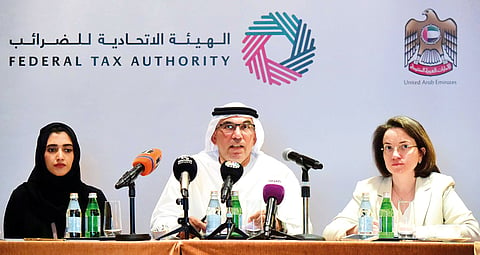UAE has achieved ‘98.9% VAT compliance’ so far
Federal Tax Authority also accuses a number of companies of failing to register under new tax system

Dubai: Almost all, or 98.9 per cent, of the companies in the UAE required to file tax returns have done so on time, according to Khalid Al Bustani, director-general of the Federal Tax Authority (FTA).
However, Al Bustani, who spoke to media to mark the first 100 days of VAT in the UAE, said he suspected a number of companies have failed to register, either deliberately or accidentally, for value-added tax (VAT).
“We will not tolerate tax evaders, and we will not tolerate tax avoiders,” Al Bustani said sharply. “We want to pass the message on: It’s an obligation to register, and they are violating the law if they don’t.”
The FTA has postponed the penalty for not registering until the end of April to give companies more time to prepare their business, but it said on Wednesday that this did not mean these companies were exempt from registering. The law does not provide for another extension of the penalty period, the FTA said.
Companies who had not yet registered were “obliged to,” and were obliged to “pay VAT amounts since January,” Al Bustani said bluntly.
100 days of VAT in numbers
■ Since January 1, 77 applicants have passed the FTA's tax agents exam, 21 are currently licensed tax agents, with 56 currently completing registration requirements.
A total of 100,000 telephone calls have been answered, an average of 1,123 calls per day.
Email queries answered 70,000, average of 787 emails per day.
275,000 VAT registrants to date.
“We will need to take action against them... Those who have not registered are tax evaders. We will take necessary actions,” he said.
To combat this, the FTA says that it has planned a roadshow with the Department of Economic Development (DED) to send its analysts to these unregistered companies to “help them register, if they are having technical issues.”
Al Bustani refused to speculate on how many companies the FTA suspected of not being registered, saying that it was impossible to tell because the system was still in its infancy.
Despite this, he said that the FTA had attained a good level of compliance for firms’ tax returns.
”We have achieved 98.8 per cent compliance,” Al Bustani told the gathered media on Wednesday morning.
“Even though the UAE is new to the tax system, achieving that level of compliance reflects how advanced the UAE is. They were ready for the implementation of VAT,” he added.
Al Bustani also pointed to the success of the self-declaration system, which encouraged private sector companies to submit tax returns on a self-declared basis.
“VAT came after comprehensive studies from the UAE. The results of studies showed that a new tax will support economic development,” Al Bustani said.
According to the FTA, around 275,000 companies have registered to date, with 2,160 applications pending. The 5 per cent tax was implemented on January 1, 2018, as part of the government’s strategy to diversify its revenues. The FTA says around 14,402 firms were forced to resubmit their applications.
“We are under discussion with these companies, who needed to re-apply due to missing information, or information not submitted correctly, before they can be approved by the FTA,” Al Bustani said.
Meanwhile, the FTA said that it suspected a number of companies of not registering.



